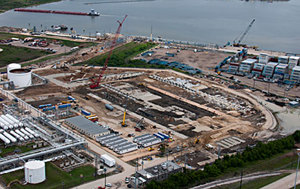Enterprise sets record for volumes at Texas gulf coast marine terminals
HOUSTON -- Enterprise Products Partners L.P. announced that the combined exports and imports of hydrocarbons across its marine terminals, including 18 deepwater docks along the Texas Gulf Coast, totaled a record 146 MMbbl on a gross basis during the first quarter of 2017.
The previous quarterly record was 136 MMbbl in the second quarter of 2016. The loading of natural gas liquids (NGLs), crude oil, condensate, refined products and petrochemicals accounted for approximately 62% of total marine terminal volumes in the first quarter of 2017.
The following is a breakdown of average daily marine terminal volumes by product in terms of thousand barrels per day (Mbpd), for the first quarter of 2017 on a gross basis before taking into account the company’s net interest in certain JVs:
- Crude oil (WTI, Light WTI, condensate, West Texas Sour, etc.): 648 Mbpd
- NGLs (ethane, propane, butanes): 569 Mbpd
- Refined products (gasoline, diesel, jet fuel, methanol, MTBE): 384 Mbpd
- Petrochemicals (propylene): 15 Mbpd
“Our marine terminals reported a 16% increase in gross volumes for the first quarter of 2017 compared to the first quarter of 2016 to a record 146 MMbbl, or 1.6 MMbpd,” said A.J. “Jim” Teague, chief executive officer of Enterprise’s general partner. “Gross NGLs and crude oil marine terminal volumes for the first quarter of 2017 increased by 25% and 9%, respectively, compared to the first quarter of 2016.”
“Our Enterprise Hydrocarbons Terminal on the Houston Ship Channel is well positioned to facilitate the growing global appetite for US produced NGLs, crude oil, condensate, refined products and petrochemicals. With our recent investments in dock expansions, this facility has the capacity to handle up to 2.0 MMbpd, depending on the mix of hydrocarbon cargoes and imports versus exports,” said Teague.







Comments